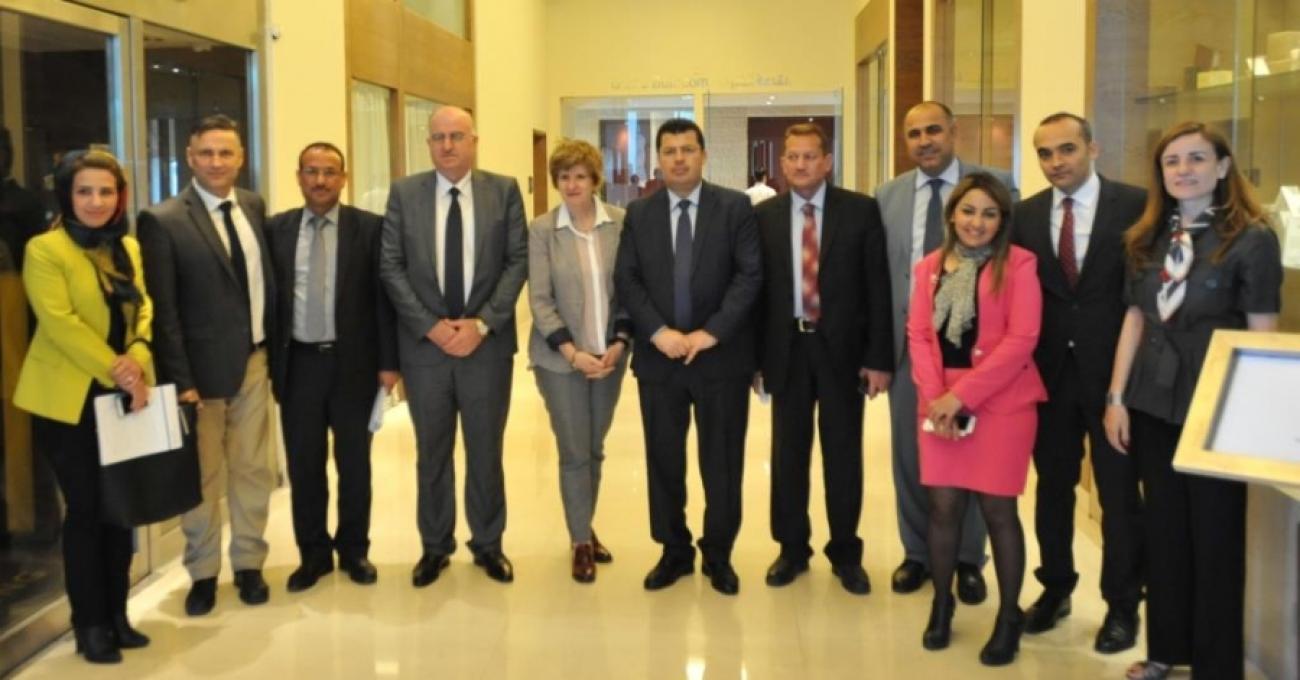DHC Gilmore visit to Erbil

The United Nations Deputy High Commissioner for Human Rights, Ms. Kate Gilmore, travelled to Erbil on Wednesday, 20 April 2016.
Ms. Gilmore met with members of the Provincial Council of Ninewa Governorate and representatives of various ethnic and religious communities from the Kurdistan Region (KR) Ministry of Religious Endowment.
The Ninewa Provincial Council delegation was headed by Provincial Council Chairperson, Mr. Bachar al-Kiki, and consisted of a range of ethnic and religious community representatives, including the Christian, Shabak, and Yezidi. They related to Ms. Gilmore the suffering of their people at the hands of the so-called Islamic State of Iraq and the Levant (ISIL), the needs of IDPs, and the urgent need to ensure that people returning to their places of origin are able to access basic services. They called on international assistance to help rebuild their homes and livelihoods that have been destroyed by ISIL and to ensure the accountability of the perpetrators of crimes committed against their communities and justice of the victims.
The representatives of the KR Ministry of Religious Endowment, encompassing a number of religious faiths, including Sabaean Mandaean, Christian, Jewish, Baha'i, and Zoroastrian, related to the Deputy High Commissioner the discrimination they have faced over decades, and the human rights violations and abuses that their communities have been subjected to – ranging from denial of access to basic services, seizure and confiscation of property, expulsions, killings and other serious human rights violations.
A number of communities recounted how they had been subjected to laws that had deprived them of their rights, including Jews, Baha’i and Zoroastrians, while many today have no recognition under the Constitution of Iraq or the laws of the country. The representatives of the Endowment noted that much had been done by the Government of the Kurdistan Region of Iraq to ensure their rights, but more needed to be done to support their communities, particularly following the devastation that has been caused by ISIL and the heavy toll this has taken on them. They called for support from the international community to ensure the recognition and protection of their rights throughout Iraq, and to assist them restore their full rights as citizens, including the repeal or amendment of discriminatory laws, restoration of properties or compensation for their properties that have been expropriated by previous regimes, and the protection and restoration of places of cultural and religious significance.
The Deputy High Commissioner expressed her deepest sympathies for the suffering that the members of religious and ethnic minorities have endured over decades – and the terrible toll that the actions of ISIL had taken on them, including the loss of lives, sexual and other forms of violence, destruction of their properties and wanton destruction of their places of religious and cultural significance. However, she also praised the resilience of their communities in face of such atrocities. She expressed the full support of the Office of the High Commissioner for Human Rights to assist them in claiming their rights and in restoring and protecting their communities from the effects of human rights violations and abuses, and in developing strategies for ensuring their protection and their full and equal participation in the political, economic, and social life of Iraq.
In relation to ensuring justice for their communities, the Deputy High Commissioner said, “It is essential that we document and denounce the human rights violations that have taken place and continue to take place, not only so that we don’t remain silent in the face of what has happened but to preserve the basis for justice for the victims of gross human rights violations that may amount to war crimes, crimes against humanity and genocide. It is simply essential that we prepare the way for ensuring accountability for those crimes”.
She noted that this is why the High Commissioner for Human Rights had repeatedly called on the Government of Iraq to take steps to ensure that Iraqi courts have appropriate jurisdiction over international crimes (including war crimes, crimes against humanity and genocide) but that it also consider becoming a signatory to the Statute of the International Criminal Court.
In pledging the support of the Office of the High Commissioner for Human Rights in assisting Iraq’s diverse ethnic and religious communities to claim their rights, ensure their protection, and assist their return and recovery to their places of origin following the devastation inflicted on them by ISIL, Ms. Gilmore praised the action taken by members of their communities to stand up for human rights. “To be heartbroken by the suffering of the people of Iraq, by the unconscionable toll that violence has exacted on so many children, women and men – that is compassion. But when the consequences of those atrocities are also met with a vision beyond them, a future vision of justice, peace and of reconciliation - that is courageous and priceless. We honour you as members and representatives of your communities for your courageous work to put that vision into action", the Deputy High Commissioner stated.
Photos: UNAMI PIO


